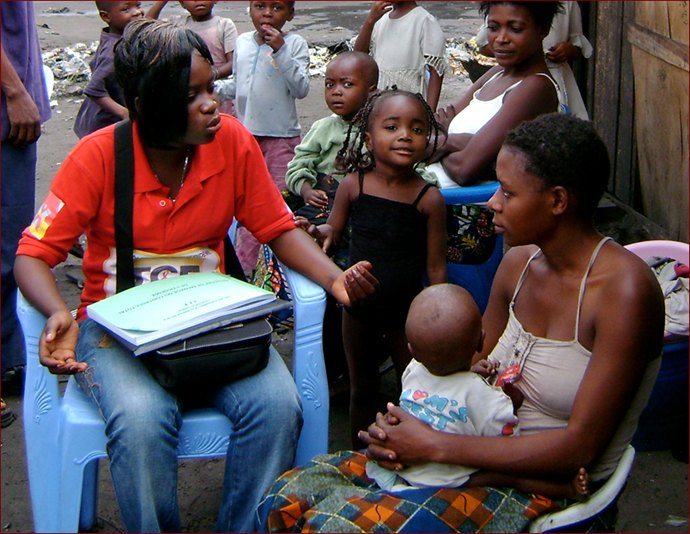Community cadres lead the way to epidemic control in the Democratic Republic of the Congo (DRC)
By Bodil Sejeroe, Country Director, Humana People to People Congo (HPP-Congo)
In Kinshasa Province, people in the Mont Ngafula 1 Health Zone commemorate World AIDS Day 2023 with gratitude for their lives. Laurette Mbo Luka and Yoshua Kasongo are thankful for medication that enables them to "spare others from this scourge." To lend courage to others, they shared stories of hope and of help they received from the Tonga Nzoto TCE project, funded by the US Centers for Disease Control via PEPFAR and led by the local organization Humana People to People Congo (HPP-Congo, https://www.hpp-congo.org/en/). Tonga Nzoto is a "TCE" project – Total Control of the Epidemic – an approach that builds the courage, knowledge, and skills of people while working closely with health facilities to improve services. This approach succeeds due to its development of community cadres and links to facilities.
The TCE approach recognizes community cadres and people living with HIV (PLHIV) as drivers of change, supporting them to demand improved access to convenient services and assistance from their communities. Because the first step is testing for HIV, index testing – finding and testing the partners of PLHIV – has become key to stopping HIV transmission in the DRC. Tonga Nzoto TCE Field Officers understand the anxiety that comes with testing for HIV but emphasize that HIV medications can suppress the virus and keep partners and mothers from spreading it to others.
Laurette, a single mother, felt shock when a man with whom she was in a relationship confided that he had tested positive for HIV. A Tonga Nzoto TCE Field Officer, Trésor Mvumbi – an expert in community-based HIV index testing – help Laurette test and accompanied her and her partner to a health facility. A nurse continued the support, through smiles and jokes as well as a serious discussion about HIV. After Laurette also tested positive for HIV, both the community and health facility staff of the Tonga Nzoto TCE project buoyed her up with explanations of HIV medication and the value of perseverance in attending treatment appointments and continuing to take the medication. "Thanks to the support of the team," Laurette says, "I will live as long as possible and enjoy all of my rights like everyone else."
Yoshua’s family had given up hope that he would ever be well, as he had lost 30 kilograms of weight over years of illness and infections. He had not tested for HIV until he met two of the Tonga Nzoto TCE Field Officers charged with detecting HIV and TB cases in his community. The Field Officers visited Yoshua at home, tested him for HIV, then helped with transport to a health facility. Once linked to the health facility, Yoshua started anti-retroviral treatment (ART), and the Field Officers visit him at home and check on him via mobile phone to ensure that he takes his medication consistently. Due to the organized care of Tonga Nzoto TCE and the cooperation between communities and health facilities, Yoshua has been able to resume his life.

Through its focus on areas with high HIV burden, and on priority populations, the DRC has reduced new HIV infections and AIDS-related deaths by more than 60% over the past two decades (according to the Global Fund). HPP-Congo has contributed to lowering rates of new HIV infections through its work with PEPFAR/CDC and the Ministry of Health to develop index testing and reach PLHIV. HPP-Congo trains Field Officers from local areas to be counselors and promote the benefit of knowing one’s HIV status. TCE Field Officers become the outreach arm of health services by linking with health facility staff to reach PLHIV and their sexual partners with HIV testing, and ART if needed. TCE village volunteers sustain support groups with home visits that complement ART. Field Officers and trained community cadres of peer educators and case managers support prevention, testing, and treatment as well as campaigns to banish stigma.
By focusing on people and not on disease, HPP-Congo’s approach supports community action – and this has achieved results. TCE has reached over 504,000 Congolese, with index testing reaching 32,000 who did not yet know their status." In the last year, Tonga Nzoto TCE reached over 200% of its target for prevention and linked 98% of patients testing HIV-positive to antiretroviral treatment.
With these results, after two decades we can see the way to finally controlling the HIV epidemic. UNAIDS, PEPFAR, and HPP-Congo realize that programs that put people and communities first have had the biggest impact. As UNAIDS Executive Director Winnie Byanyima says, “success depends upon action.” HPP-Congo supports her 2023 World AIDS Day message: Let communities lead! To succeed, we must let communities light the way and lead the way.
This year we celebrate the 20th anniversary of PEPFAR, which has saved over 25 million lives. As US Global AIDS Coordinator Dr. Nkengasong and his team state in PEPFAR’s vision for sustaining the HIV/AIDS response this World AIDS Day, ending the HIV pandemic requires centering community voices. (Sustaining the HIV/AIDS response: PEPFAR's vision)
In solidarity, on this World AIDS Day, HPP-Congo’s call to action is for everyone to support HIV prevention and treatment to finally end the epidemic – to advocate for equity for adolescent girls and young women and the human rights of key populations, and to support community cadres as everyday heroes.
